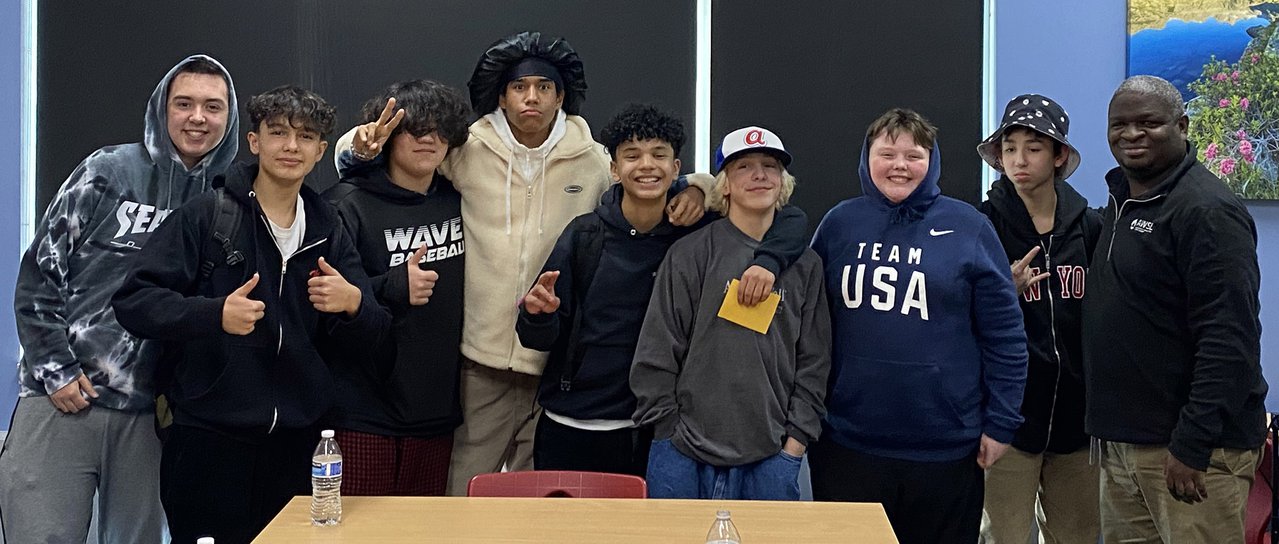

Student Leadership

Skyview Middle School Students (L to R): Jaxsen Bunnell, Juan Filipe, Berrondo, Kala Celms, Duncan Green, Sam Gutierrez, Dominic Lalario, Walker Chapman, Aaron Linn, James Layman (AWSP)
ARRIVE CURIOUS. LEAVE INSPIRED.
An afternoon of listening to students yields big dividends
James Layman
AWSL Director
Evaluation Criteria: Creating a Culture, Improving Instruction, Closing the Gap
Section: Staff Articles
Several months ago, at a Launching School Leadership session, AWSP Deputy Director Jack Arend showed me a picture of a sign with those four words from outside the Gates Foundation Visitor Center. The four words were instrumental and foundational for me as I met with eight experts on school culture and climate.
I have the privilege of sitting down with eight eighth-grade boys from Skyview Middle School in the Northshore School District. Their principal, Matt Wallace, committed to creating a culture in his school and wanted to hear from students. The Association of Washington Student Leaders loves partnering with school leaders to build a bridge between student voice and school culture. We set up a date, and he selected eight students for me to connect with and, most importantly, learn from.
Students know what is needed. They are plugged into the sounds, sights, and happenings of all aspects of our schools. Are we brave enough to ask? Are we brave enough to listen? Magic happens when we sit in the learner’s seat and listen to their brilliance and expertise.
For some context, these eighth graders are in their ninth professional year as students. So collectively, they had 72 cumulative years of expertise on culture, climate, student voice, elevating the next generation of leaders, scheduling, and connection. Each of them provided incredible insight. They laughed, shared, were authentic, and, most importantly, they were experts, from a student who just moved to the school from Texas, to another who has his own e-commerce site, to a rising soccer star. Their diverse perspectives provided an afternoon that I will not forget.
What I learned:
- Connection is everything. In 2018, Starbucks focused on becoming the "third place" for adults. The third place for adults means that we have work, home, and we need a third place to come together, share, laugh, connect, and be. Starbucks wants to be our third place. For the bulk of our students, school is their second place. They have home, and they have school. School is where friendships are formed, where they navigate the world, and where they learn more than just curriculum. The experts repeatedly restated that students want to connect with their teachers, principals, and adults and with each other. School is more than just a place to learn Math, Science, and History; it is the epicenter of their social network. It is where they can be inspired, elevated, or lost in the shuffle. Dedicating time to connection (peer-to-peer and adult-to-student) is critical.
- Go beyond the surface. "When a teacher goes beyond getting mad at me for not doing my homework, and they ask why I didn't do my homework, it means everything." The experts were candid about educators and school leaders that took time to go beyond what is on the surface. It can be transformative when adults take time to learn about students and know what is going on with them. "When they (teachers and school leaders) help us with personal stuff, take time to get to know us, open up, and ask us about life - those are the best classes and times."
- Non-playable Characters (NPC). means "non-playable character." It's a term borrowed from video games for a character controlled by the computer or game rather than by a player. When the conversation about the "vibe" of the school was brought up and what we as adults should better understand, the experts introduced me to the term "non-playable character." Due to internal, external, and societal pressures, the students described that many attending schools currently come to school, go home and do homework, and repeat. They do not want to connect socially; they do not desire to meet new people; they are focused solely on the school aspect of school. This has caused stress in the system, as many students want to connect and experience the social aspect that schools can provide beyond academic commitments. The NPC aspect has created a social rift between students and their ability to grow and connect collectively.
- The soundtrack means everything. We had a conversation about growing the next generation of leaders. I asked the experts why more students are not joining leadership positions at the same rate as in years past. Their answers were simplistic in their delivery but powerful in nature. "When we hear we can't do something a thousand times, eventually we are going to believe it and not care anymore." What is the soundtrack we are creating for students? Are we reminding them of what they can do, or are we intentionally or unintentionally letting them know what they can't do? The bottom line is that they are listening to us. They take every word to heart, remember it, reflect on it, and then act on it based on what they heard. "When I heard that boys can't be leaders and they have no leadership skills, I started to believe that." Every day and every moment with our students, we have the opportunity to elevate them, lift them, remind them of their worth, and let them know that they are extraordinary beyond measure. The experts reminded me of this and the power of language, communication, and our choices.
- Final thoughts. As our meeting ended, I asked each student to give us their final thoughts. Once again, they dropped the mic with their prolific words and ideas:
- We need to look at people as humans. We are like eggs; we all have the same stuff on the inside.
- We, as students, need to remember that we are not the only person feeling the way we do.
- We need to take care of each other.
- We need to take time to learn about people.
- We need to accept others.
- We need to be social and not be robots... not an NPC.
- We need to be better with our choices and need adults to believe in us.
- Stop separating students. We want to connect and be together. We do not want to be divided.




